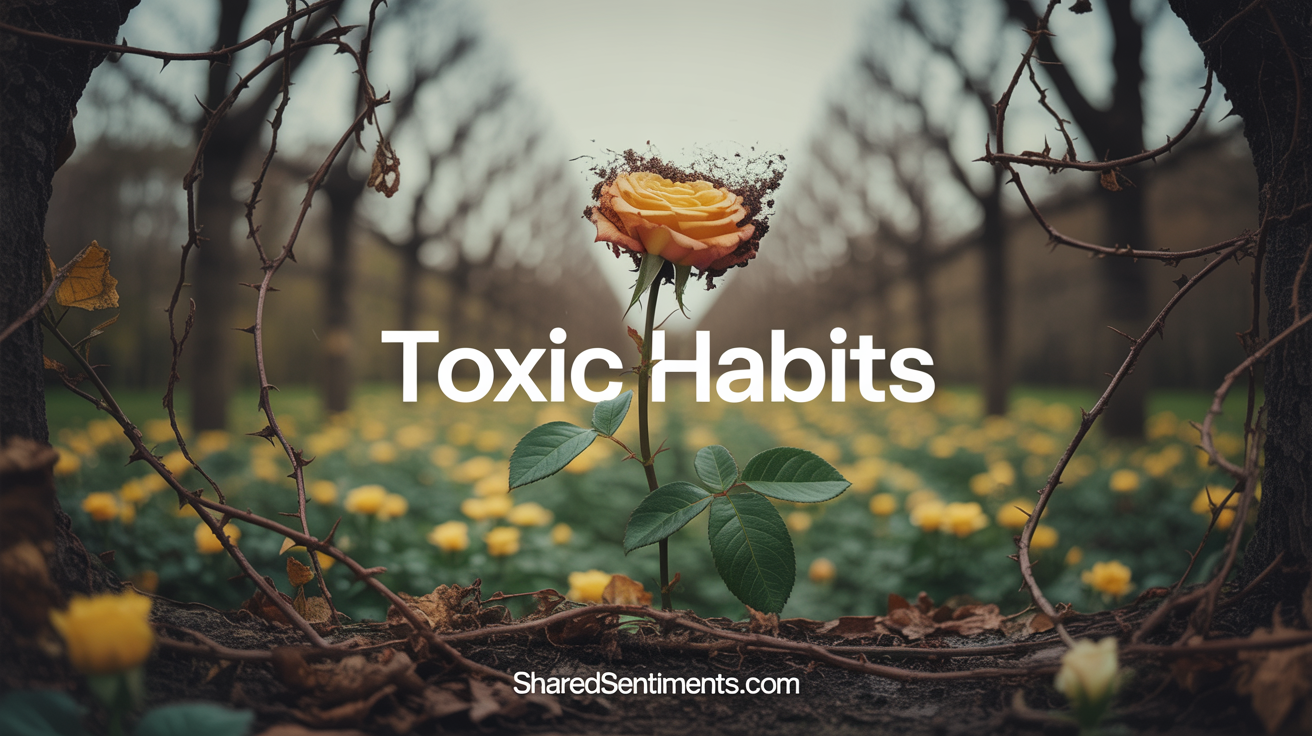10 Toxic Habits You Need To Discard Right Now

Ready to stop letting toxic habits run your life?
Start by paying close attention to what you do every day.
Some things may seem harmless, but they quietly mess with your peace and well-being.
Here’s the truth—many of us get stuck in routines that do more harm than good.
I’ve been there.
Scrolling too much, putting off what matters, letting negative thoughts take over.
These toxic habits don’t always stand out.
But they steal your time, drain your energy, and slowly take away your joy.
They make it hard to enjoy the simple things.
They get in the way of personal growth and mental clarity.
I know it’s not easy to spot them.
And even harder to let them go.
But if something keeps pulling you down, it’s time to cut it loose.
You deserve better.
You don’t have to settle for a life that feels heavy or out of balance.
I’ve had to face these same issues, and I want to help you work through them too.
If you’re ready to drop the habits that hurt you, I’ll guide you through the ones that need to go.
Feel free to save this post—you might want to come back to it.
Also Read: How To Glow Up In A Week Naturally
10 TOXIC HABITS THAT DRAIN YOUR ENERGY
1. Scrolling for Hours Without Thinking
I used to pick up my phone first thing in the morning and scroll through social media.
Then again while eating.
Then again at night.
And before I knew it, I’d lost hours.
Not only did I waste time, but I also started to compare myself to people online.
It made me feel behind, like I wasn’t doing enough.
Once I started limiting screen time, my mind felt quieter.
I had more energy and less anxiety.
2. Saying “Yes” When I Wanted to Say “No”
I thought being nice meant always agreeing to things.
Even when I was tired or overwhelmed, I’d say yes.
Yes to plans.
Yes to extra work.
Yes to things I didn’t even want to do.
And then I’d feel resentful and burnt out.
Learning to say “no” didn’t make me a bad person.
It helped me protect my time and peace.
Saying “no” can actually be one of the kindest things you do for yourself.
3. Putting Myself Last Every Time
This one hit hard.
I was always putting other people’s needs before my own.
Friends, family, work—everyone came first.
I told myself I didn’t have time for self-care.
But really, I just didn’t think I deserved it.
Once I started doing small things for myself—like resting when I was tired or taking a walk when I felt anxious—I began to feel more human again.
You matter too.
Take care of yourself like you would someone you love.
4. Overthinking Everything
I could turn the smallest thing into a huge problem in my head.
I’d replay conversations.
I’d worry about things that hadn’t even happened yet.
I’d second-guess every decision.
It made me exhausted.
I had to teach myself to pause and ask, “Is this actually a problem right now?”
Most of the time, it wasn’t.
Letting go of overthinking gave me room to focus on what really mattered.
5. Waiting for Motivation to Start
I used to tell myself I’d do things when I “felt ready.”
Like working out.
Or cleaning.
Or starting a project.
But most of the time, that feeling never came.
I realized motivation doesn’t come first—action does.
Even doing one small thing helped me build momentum.
And the more I did, the better I felt.
Now I don’t wait.
I just start.
Even if it’s messy.
Even if it’s small.
6. Always Looking for the Worst-Case Scenario
I used to prepare for the worst.
All the time.
I thought it was being smart.
But it made me feel nervous and heavy every single day.
I was always bracing for bad news.
Once I noticed this, I started to challenge those thoughts.
I’d ask myself, “What if things actually go right?”
It felt weird at first.
But slowly, I learned to expect good things too.
Not everything needs a backup plan.
Sometimes, it’s okay to hope.
7. Talking Badly About Myself
I wouldn’t say the things I told myself to anyone else.
I’d call myself lazy.
Or say I wasn’t good enough.
Or joke about how I always mess things up.
But those words were cutting me down.
They became part of how I saw myself.
I had to work hard to change that.
Now I try to speak to myself the same way I’d speak to a close friend.
Kind.
Patient.
Supportive.
8. Ignoring My Body
There were times I skipped meals.
Slept too little.
Pushed through pain or stress like it was nothing.
I thought that’s what “being strong” meant.
But it’s not.
Ignoring your body doesn’t make you strong—it makes you burnt out.
Now I try to listen when my body tells me it needs rest, food, movement, or just a break.
Your body is not the problem.
It’s trying to help you.
Listen to it.
9. Surrounding Myself With Negative People
I didn’t want to admit it, but some people in my life made me feel worse.
They complained all the time.
Gossiped.
Made me feel small or guilty.
At first, I thought I just had to deal with it.
But I realized I could choose who I spent time with.
Once I started spending more time with kind, honest, and supportive people, everything changed.
It’s okay to outgrow people who drain you.
Protect your peace.
10. Thinking I Had to Be Perfect
I thought I had to have it all together.
No mistakes.
No bad days.
Always doing things “right.”
That kind of pressure broke me down.
Perfection isn’t real.
It’s just fear wearing a mask.
Now I focus on progress, not perfection.
Some days are messy.
Some things don’t go to plan.
And that’s okay.
I’m still learning.
Still growing.
And that’s enough.
Final Thoughts
Toxic habits don’t always look harmful from the outside.
They can feel normal—until one day, you wake up tired, stressed, and lost.
That’s what happened to me.
But I didn’t have to stay stuck.
Little by little, I started letting go of the things that weren’t helping me.
You can too.
You don’t need to fix everything overnight.
Just notice the patterns.
Start small.
Be honest with yourself.
And remember—you’re allowed to change.
You’re allowed to grow.
One habit at a time.






